I won’t pull punches here; I am horrified, it not entirely shocked by the vast number of women in particular who have confessed how traumatic this election season has been for them, thanks in no small part to abuse on social media from those in their networks.
Not just strangers, but people they consider friends, acquaintances, colleagues, even family.
Over the last several weeks in particular, they’ve asked for advice on engaging with hostile friends; on the conventional wisdom about blocking or unfriending abusive commenters; on locking down Facebook privacy settings to limit the number of negative interactions they’re having.
It’s pretty awful.
Related: How to talk to your kids about politics during an ugly election season
While every election cycle comes with its share of I’m unfriending anyone who thinks… I think we can safely agree on one thing: this year is like no other.
The vitriolic rhetoric of the election as a whole, coupled with the inability for some to leave like-minded echo chambers and hear opposing viewpoints, all mixed up with the complete emboldening that anonymity and the digital divide offers, all makes for one toxic cocktail.
This is not about playing the victim. This is not about being weak.
In fact, if you’re feeling attacked or disparaged on social media every day, taking steps toward self-preservation is one of the strongest moves you can make. I can’t say that emphatically enough.
As someone who’s active in the political sphere and been around the block on social media, I’ve put together some of the best advice I’ve seen or offered myself to friends, family and readers, in how to maintain civility on social media and how to manage Facebook in particular — though much of this applies to all your social channels. And that includes email.
(Hey, some of us still have crazy second-cousins emailing every conspiracy theory video they can find on YouTube.)
And for those of you who may think, “well, just get offline if you don’t like it!” I disagree vehemently. We need good, kind people to stick around to make online social discourse the best of what it can be.
So I really hope that these tips and ideas help you to remain engaged, while preserving your own well-being. And hopefully even your relationships.
1. Your social stream, your rules.
This is a rule that nearly every long-time blogger will tell you — you have not only the right, but the responsibility to maintain the kind of Facebook wall, comment section, or social feed that you want. Even when it comes to political posts.
For me, that means that respectful dissent and discussion is always allowed, but when it devolves to name calling, ad hominem attacks on me or my friends, offensive memes, hate speech, or the posting of refuted propaganda links and conspiracy theories, I draw the line.
You have to figure out your own line, but you have the absolute right to say no as you see fit. Even national digital publications and social networks set commenter guidelines, and you can too.
“Free speech” doesn’t mean “come into my home, sit on my couch, drink my wine, then smash the glass to the ground, kick my dog and call everyone an assh*le.”
2. Apply the rules evenly and consistently
I have seen the C-word used enough for a lifetime over the past year alone, and I say this as someone who doesn’t offend easily and can curse like a sailor on demand. Even so, misogynistic and racist terms are not allowed on my Facebook wall, period. That’s my own rule; you have to set your own.
However, if you decide that curse words or hate speech are not okay when directed at someone you respect (whether a friend or a candidate you’re supporting), you have to be consistent. You can’t let it slide it when it seems to support your own point of view.
I confess this is something I had to work on really hard myself. Hopefully I’m more consistent than I was when I first got online.
3. Deleting inflammatory or hurtful comments is not “censorship.”
A lot of us fear being accused of “censoring” our social networks (particularly when we feel a commitment to the principles of free speech) and therefore let comments stand — even when they are disparaging, hateful, racist, or bigoted.
Your Facebook wall and social feeds are not others’ personal vomitoriums.
To be perfectly clear: You have the right to demand civility and respect from friends and family in your life. And your right to receive that civility and respect, eclipses any perceived “right” they may believe they have to say anything at all, no matter how hateful or hurtful. Setting rules for behavior is not censorship, and requiring a modicum of kindness in our discourse is not a character flaw.
When we all insist on civility, we in fact create more safe spaces that will ultimately engage more people in healthy discussion and debate. That’s actually the opposite of censorship.
4. Check yourself
Several times, I’ve rushed to the aid of a social media friend at her urgent request — only to find that she was just as responsible for the level of hostility in the conversation. As a friend wisely observed, a spirited argument can easily slip into abuse. So take a good look at yourself too; it’s easy to get caught in the moment and let emotions take over your better judgment. We’ve all been there.
If you feel dangerously close to saying something you regret, maybe it’s time to log off, and take a walk around the block. Eat an ice cream sandwich or two. (Always works for me.)
One great trick is, ask yourself before you comment, “would I say this to my boss? To my kids? To my mom? To my best friend? Or if any of them saw my comment, could I stand behind it?”
That may lead you to the delete button faster than you think.
5. De-escalate
I happened to love Michelle Obama recent statement, when they go low, we go high, and there’s a reason I’m still seeing this rallying cry for civility repeated everywhere — it works! It also makes you feel empowered, instead of victimized.
There’s something truly satisfying about knowing you’ve helped to calm the room.
For more info, several friends recently turned me onto the recent Flip the Script episode of the excellent NPR Invisibilia podcast which is absolutely fascinating. It’s worth a listen, for some surprising examples of how combatting hostility with love or compassion can be far more effective than fighting fire with fire until we just burn everything down.
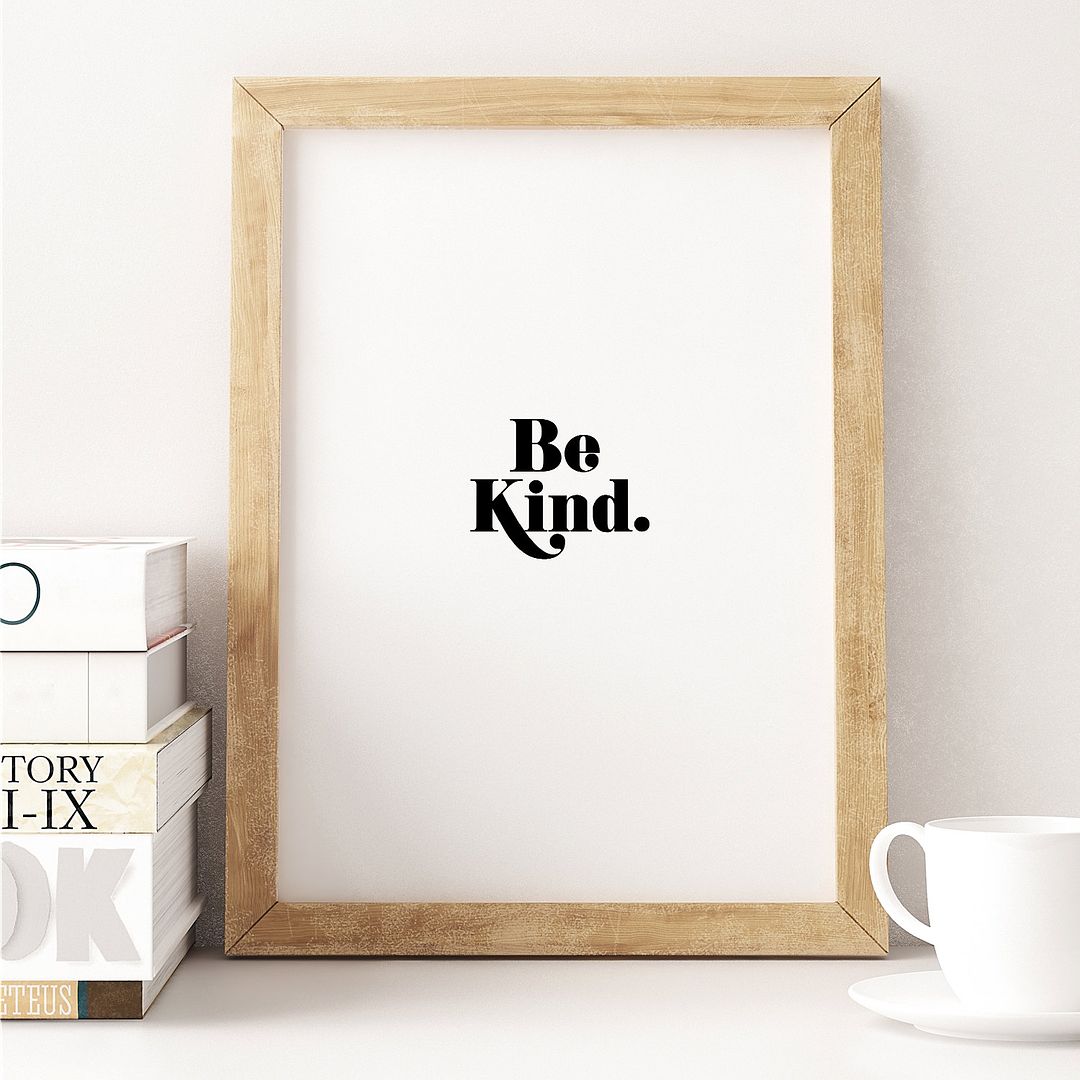
Be Kind print: Love Shop on Etsy
6. Consider speaking to a friend privately, instead of calling them out publicly.
If you want to maintain your friendships and relationships post-election, so you can go back to talking about The Bachelorette, funny cat videos, the humor of parenting, or whatever it is that connected you in the first place, then act like a friend would, and give him or her the benefit of the doubt.
While it can be tempting to take someone down if you feel you’ve been slighted or attacked, sometimes it’s best to DM, email or (gasp) pick up the phone and have a civil conversation about your feelings, instead of publicly striking back, deleting a comment or flat-out blocking a friend. You may find this tactic makes you much more able to resolve the situation and at worst, “agree to disagree,” (cliché though it may be), through November.
For a compelling perspective on how to engage positively, check out the How to Listen When You Disagree post on Urban Confessional. While not everyone will have his patience, Benjamin Mathes describes how listening without judgment helps reveal the root of someone’s beliefs or anger or attacks — and it’s generally not about you.
(By the way, that’s another amazing self-preservation tip when you’re under attack: Remember that name-calling and anger says more about that person than it does about you.)
I recently had my own private conversation with a long-time male friend who allowed a lot of pejorative terms to describe women on his own Facebook posts, without condemnation. I explained that it made me feel uncomfortable, and asked why he allowed it. His belief was that he didn’t want to censor; and that if the terms were directed at a candidate, and not directly to a friend, he felt it was okay.
I heard him, but then explained that he would not likely allow the N-word or similar racial epithets on his wall, even if not directed directly toward a friend.
“I never thought of it that way,” he confessed.
We ended up having a fantastic conversation. Plus, I kept a long-time friend. Highly recommended.
7. Know that someone who says “unfriend me” is probably not your friend.
Recently, Meghan Arnold shared a story in which she asked a man she knows to stop jumping in on every post of hers to attack her, to agree to disagree, and to stop trolling her. His response: Unfriend me, then.
Uh…no.
Her subsequent comment to him was about the best I’ve ever seen:
So basically you’re telling a woman that she needs to be the one to mitigate her own harassment?
Boom!
(And here, let me reassert that this is not at all a male vs female issue, though women do seem to bear the brunt of it most painfully.)
Think twice about whether people like this are worth keeping as friends. Or even, social media friends. I think as women, we often feel an obligation to try and make an abusive person less so, to show them the light, to heal. That may be a longshot that may not be worth your time or the mental anguish it subjects you to.
But then, do try and separate real abuse from passionate disagreement. They are not the same thing.
I remember a colleague who I liked very much, engaging me about some contentious political issue or another years ago. It wasn’t abusive, just…feisty.
I DM’d him to say look, I respect you in business and we should probably just not connect on social media so we can maintain that business relationship. He was quick to agree. Conflict won’t always work out this well, but I’m glad this one did.
8. Lock down your Facebook settings.
If you decide to engage on public pages, I don’t want to dissuade you, but go with thick skin. However if you’re mostly dealing with attacks from strangers on your own page, that’s a much easier fix.
In fact, I’m amazed at how many people have asked me about dealing with trolls on their Facebook pages, only to learn that these were complete strangers who just popped in to be jerkfaces (smash your wine glass, kick your dog), then leave.
Nope.
We’ve written many times about double checking your Facebook privacy settings, especially since they change so often without any clear notifications. (Ahem.) Visit the Facebook privacy settings help center or just click the lock icon in your settings and go through them one by one. This is a good idea whether or not you’re having any issues with your feed.
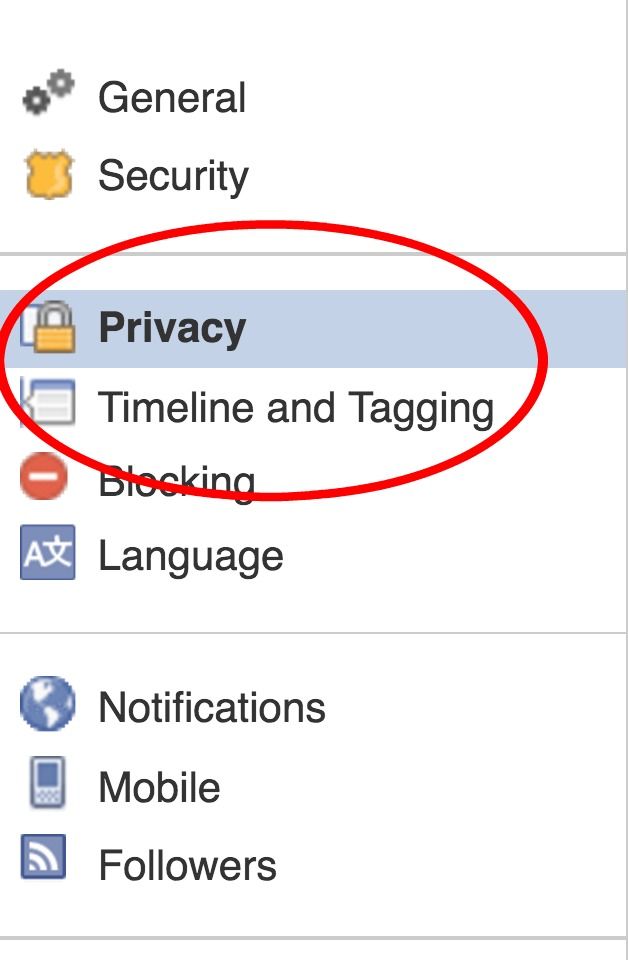
Pay special attention to your “Timeline and Tagging” settings. There, you have the ability to:
- Allow only friends (or no one but you) to post on your timeline. This is incredibly important because it means that even if you post something to “public,” strangers cannot join the conversation. (Though note that they may be able to like posts and comments, or comment if they are friends of friends tagged in your post.)
- Review posts that you’re tagged in before they appear on your timeline. This is a great way to prevent people from adding your name to memes or photos that you find offensive.
- Limit friend requests to only friends of friends which significantly cuts back on trolling.
You can also create lists of friends for sharing posts in a limited way. Maybe it’s a collection of “safe” friends you know you can vent to, or a list of “fellow Dems/Repubs.” Or, if you can count your troll-y friends on one hand, you can eliminate specific friends on any given post.
Before you hit publish, toggle the audience to select as “all friends except ____” and customize, or add them to the “restricted list” which will allow a whole group (say, that one group of in-laws with the extreme views?) to see your public posts, but not your friend posts.
9. Consider unfollowing before blocking or unfriending.
We all know that the dreaded “unfriend” is, for some, a fate worse than death — let alone “blocking,” the social media nuclear option. I think of them as a last resort; sometimes necessary, but not likely to solve any interpersonal issues. See also: #5, above.
On Twitter, the mute function is a stealthy way to simply stick your fingers in your ears and go “lalalala can’t hear you!” without losing a friendship. It’s especially effective for friends who seem to retweet once every 30 seconds, political season or not. (Have I said too much?)
On Facebook, your best option is to unfollow. Just click on your friend’s “following” tab and select “unfollow” as shown here. (Don’t worry Kristen, I’d never unfollow you!)
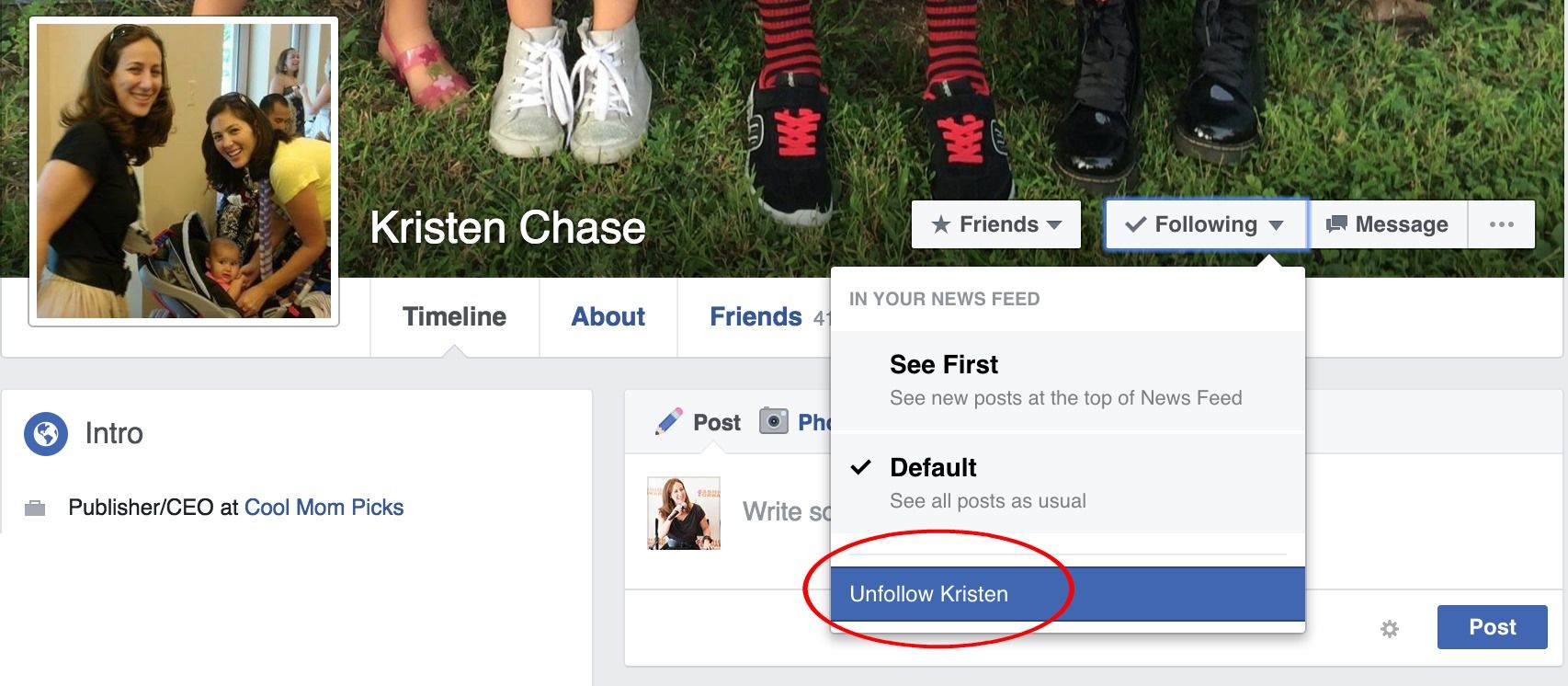
This means you still remain friends and can see that person’s wall if you choose, but their posts won’t show up in your timeline. You’ll be amazed at how much less tension you’ll have, knowing that every time you check in on Facebook, you won’t be subjected to stuff that makes you crazy.
Pro tip: Set a reminder on your phone for around November 9 or so, so you can go back and reexamine whether you can start following those people again.
Funny cat videos await you in a few months!
10. Sometimes you just have to cut your losses.
I’ve always believed that you can see what kind of space you’re in by looking around and taking inventory the people in your life. Are they empathetic? Kind? Mostly positive or mostly negative? Are they energy givers or energy suckers? Your social media feeds are often a mirror of that.
Okay, so maybe that guy you went to the ninth grade dance with has turned into someone you don’t want to know now. Maybe the supervisor from your college internship, your kids’ first babysitter, your childhood BFF’s brother just aren’t really “your people.”
That’s cool. We all grow in different ways.
Now this definitely doesn’t mean you should eliminate every person in your life who holds different opinions than you do. I think that’s in part how we got here in the first place.
However if you’re consistently seeing language in your feeds that makes you feel uncomfortable, attacked, disrespected or certainly unsafe in any way, you absolutely 100% have the right to cut that crap right out of your life in whatever way will best preserve your own well-being and positivity.
What I’m saying is, don’t go. Don’t abandon social media if you love it. Stay and try and make it better.
We need more people who are happy and whole in this world, more kindness, more empathy and more civility. We need people who believe that respect works both ways and to show the world how it’s done.
We need you.
Top photo: Ilya Pavlov for Unsplash


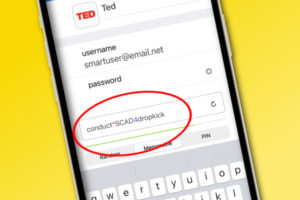


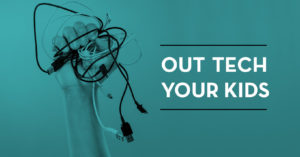
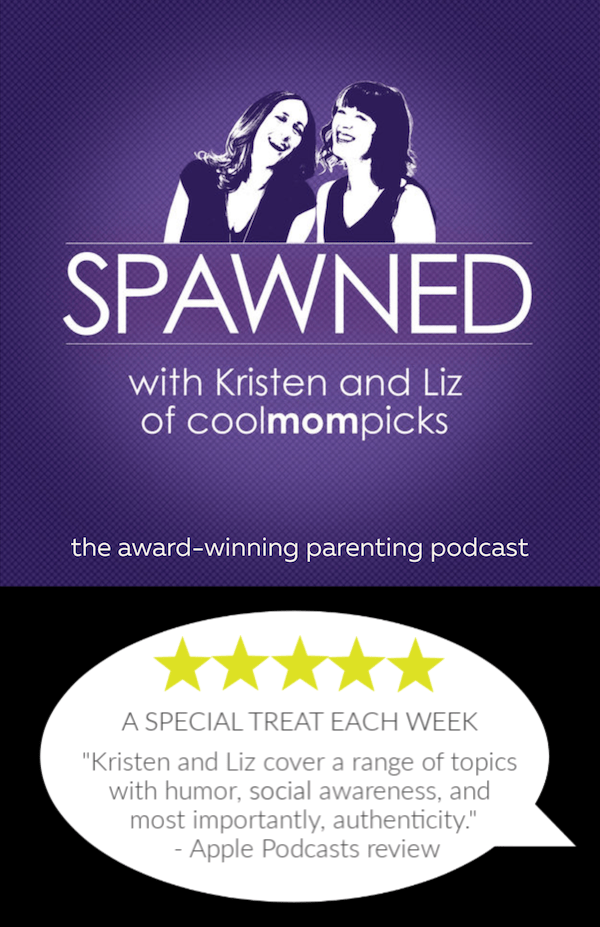
Right. It’s also fair to acknowledge that non-engagement is still a form of engagement. Letting a wrong hang infiltrates our psyche and we take the slight with us off-line. Your advice to be clear about your boundaries is spot on. By all means, address the offending comment when no doing so will weigh on you throughout your day. So, while every slight need not be fought to the death, it’s OK to engage. That’s actually why Facebook exists.
I’d like to suggest creating a “custom list” called “Unfollowed.” For people whose use of FB is very personal, not broadly inclusive, this might not matter; but I have almost 1300 “friends” on FB, ranging from family to complete strangers in distant countries. In the fall, I found too much of the primary battle was stressing me pointlessly, so I started unfollowing some people. But unlike the “Restricted” option, FB offers no way to edit one’s list of unfollowed friends. However, if at the moment of unfollowing, one were to add that friend to the custom list called “Unfollowed,” then one could visit the whole list at once and see if it is time to start following again certain friends — or at least create a feed in which one catches up with those friends while prepared for what might be an irritant. I wish I’d thought of it a long time ago!
—
Great tip Byzyntia, thank you! – Eds